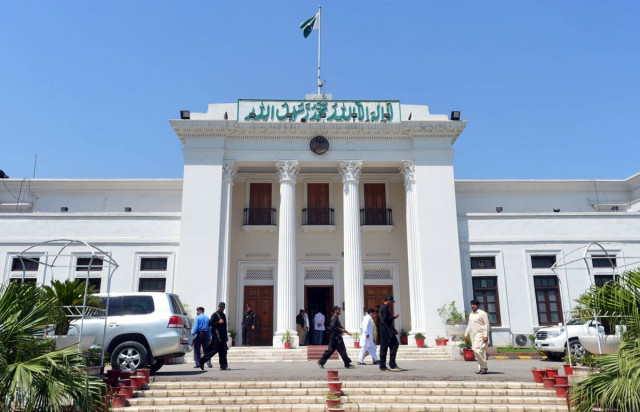Tax talk: K-P Assembly mulls introduction of Ushr
Minister says the province is unable to generate enough money in Zakat.

Minister says the province is unable to generate enough money in Zakat. PHOTO: AFP
K-P Minister for Zakat and Ushr Habibur Rehman made the announcement in response to Arshad Bashir Umarzai’s remarks drawing attention to the previous government’s inclusion of people not deserving Zakat in the list of those entitled for it. Umarzai demanded a survey at union council level to exclude such people from the list.
In response, Rehman informed K-P has about Rs700-800 million of Zakat money in its account, but claimed the amount will considerably diminish within two years.
Rehman added Zakat and Ushr fell under the purview of the provincial government following the ministry’s devolution under the 18th Amendment. He, however, maintained the province was unable to generate enough money under this head.
Rehman said the government was planning to introduce Ushr or tithe in the province, but the move required legislation. Once in place, the system can generate billions of rupees, he added.
Cabinet concerns
The issue of an inflated provincial cabinet also cropped during proceedings. The matter was first raised on a point of order by Awami National Party’s (ANP) Parliamentary Leader Sardar Hussain Babak. He told lawmakers the 18th Amendment restricts the cabinet’s strength to 11% of the provincial assembly, i.e. 15 ministers and five advisors.
However, the Pakistan Tehreek-e-Insaf (PTI)-led government had not only appointed five advisors, but also special advisors and, more recently, parliamentary secretaries, complained Babak. He termed the move an “unconstitutional step” and questioned under which law the government had made the said appointments. Babak also argued that appointments went against the ruling party’s claim of austerity.
Minister for Law and Parliamentary Affairs Israrullah Gandapur defended the government, saying the said clause of the 18th Amendment was adversely affecting K-P. He said 11% of the Balochistan Assembly translates to about seven cabinet members, but there are 15 ministers in the actual cabinet. He said 11% of K-P Assembly would result in about 11 ministers, adding this would literally tie the government’s hands.
Gandapur claimed the clause made sense only for the National and Punjab assemblies since they had greater strength compared to the rest of the legislatures. He also said the people who represented K-P in the committee responsible for carving out the stipulations should have thought about the repercussions at the time.
Gandapur said each minister would have had to look after two to three ministries if the government had not made these appointments.
Resolutions
The assembly unanimously adopted three resolutions. The first calls for allocation of Rs4 billion for the Lowari Tunnel project under the Public Sector Development Programe (PSDP) and was jointly moved by Finance Minister Sirajul Haq, Opposition Leader Sardar Mehtab Ahmed Khan, All Pakistan Muslim League’s (APML) lone lawmaker Ghulam Mohammad, PPP’s Mohammad Ali Shah Baacha and Saleem Khan.
The resolution called for increasing the PSDP allocation for the project from Rs1 billion to Rs4 billion to ensure its timely completion. Another resolution was moved by Jamiat Ulema-e-Islam-Fazl (JUI-F) lawmaker Zareen Gul, demanding setting up a branch of the National Bank of Pakistan (NBP) in Torghar district. The last was moved by JUI-F lawmaker Uzma Khan, demanding a ban on ‘obscene’ television programmes.
The session was later adjourned till 4:00pm on Wednesday.
Published in The Express Tribune, July 3rd, 2013.













COMMENTS
Comments are moderated and generally will be posted if they are on-topic and not abusive.
For more information, please see our Comments FAQ